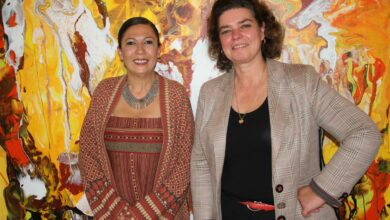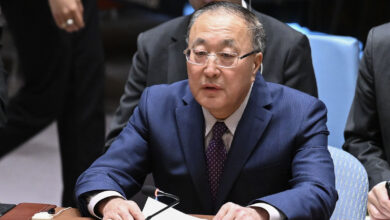The book Bechtel fi Bilad al-Arab (Bechtel in the Land of the Arabs) tells the story of the great adventurer Bechtel who, in his numerous journeys, explores magical and untamed lands. This time, Bechtel is in Arabia, a mysterious, exotic place with affluent bearded sheikhs, oppressed veiled women, seductive belly dancers and likely an Arab villain with a master plan to terrorize the civilized world. It seems like the perfect plot for a best-selling thriller. But the thick, golden hardcover is a guide for employees of the engineering firm Bechtel Corporation working in the Middle East.
The handbook–technical as it is, rife with exotic representations of a backward “other” –was one of many on display last Tuesday at the opening of the Bidoun Library exhibition on the first floor of downtown’s Townhouse gallery. Bidoun is an arts organization that promotes contemporary art and cultural production from the Middle East through its award-winning quarterly magazine and its curatorial arm, Bidoun Projects. The library is one of its latest projects.
Another interesting volume in the library is a selection of visual and linguistic puns in artist Yara al-Sherbini’s Sheikh ‘n’ Vac, which is based on a stand-up comedy routine al-Sherbini performed in London. Jokes deal with the perception of Middle Easterners in the West, particularly after 9/11.
Another piece in the library, a 1974 pocket-sized children’s book called Home, advocates the Palestinian refugees’ right of return and is beautifully illustrated by the Egyptian cartoonist and graphic designer Mohie al-Dien al-Labbad. During his forty-six year long career, al-Labbad voiced pertinent social, cultural and political issues in publications throughout the Arab world and was a strong advocate of the Palestinian cause.
The Bidoun Library, a mobile, diverse collection of over 700 books, stories and magazines, was flown to Cairo after a two-month long stay at the New Museum in New York City. It is a constantly evolving collection of books and ephemeral publications on cultural production in the Middle East produced during the past sixty years.
Initially driven by an archival impulse to safeguard the region’s documents of cultural production, many of which were going out of print or into inaccessible private collections, the Bidoun Library started with a few artists’ monographs, exhibition catalogues and theoretical books in 2003.
Many cultural institutions and publishers supported the initiative by donating publications and curating sections of the library. The trilingual Lebanese comics journal Samandal curated a collection of over one hundred comic books from old editions of the popular Sameer magazine, as well as things ranging from Tintin stories in Arabic to gaming books developed by Egyptian artist Adli Rizkallah, recent editions of Samandal and rare books like al-Labbad’s Home.
As the material was commercially unavailable, it became imperative to share the library with the public. The library’s first exhibition, at the 2009 Abu Dhabi Art Fair, impressed visitors with a wealth of creative works produced in the Middle East at a time when many cultural workers only reference successful models from the Western world.
Because it was a successful model of collaborative archiving, the Bidoun Library was invited by the Beirut art space 98 Weeks Project earlier this year to coincide with the launch of a new research project on Arab avant-garde journals and popular magazines.
The New York exhibition was a turning point for the library. In anticipation of the challenges of reaching a Western audience, the library underwent a redesign. Bidoun librarians undertook an online search of the terms “Arab,” “Iran,” “paperback,” “oil,” “1970s,” and “<$3.” The search retrieved low cost pulp novels on the cruel love of the sheikhs, Michael Jackson’s iconic “Remember the Time” music video, as well as numerous books on the veil, the violence of Islam and the indiscriminate consumerism of the Middle East. The search was meant to find the most popular rather than the most reliable information available on the Middle East.
“Seeing one thriller novel of an Israeli commando saving the world from the evil Arab or another about the dark secret life of a veiled woman might be humorous, but grouping many such publications on book shelves shows how viral the stereotypes are,” explains Alia al-Sabi, the coordinator of Bidoun Projects. The New York version of the Bidoun Library reconceptualized the banal and familiar, turning the joke around on Western audience.
Visitors to the New Museum were asked to wear white gloves while handling the books, emphasizing the exoticization of Middle Easterners in popular Western culture. The library collection contextualized Middle Eastern representation vis-a-vis important economic and political events. Publications from the period prior to the 1973 oil embargo were mostly produced by foreign companies working in the region since the discovery of oil in the early twentieth century. “Bechtel fi Bilad al-Arab” as well as guidebooks and magazines from the oil company, Aramco, were, for many decades, the sole source of information on Middle Eastern culture for the West.
Contrasting these corporate publications with issues of Quest–a bi-monthly Indian journal addressing pertinent issues in the Muslim world–and post-1973 pulp novels about greedy, sexist Arabs draws a fuller picture of the Middle East’s cultural production and representation. Some books featured in the New York exhibition, particularly those criticizing Middle Eastern governments, are omitted from the Cairo exhibition.
At the Townhouse, the Bidoun Library is changing the gallery space in an unprecedented way, opening it up to an audience beyond regular art gallery visitors. Twelve-year-old Ahmed, who works at a nearby carpenter’s shop, visited the gallery for the first time, flipping through various books and looking at the Aramco poster series.
The Bidoun Library will exhibit next at the Serpentine Gallery’s Center for Possible Studies on Edgware Road in London. Edgware Road is a Middle Eastern enclave in the heart of London, and Bidoun Projects is currently working on redesigning the library to respond to its new exhibition context.
The Bidoun Library is exhibited at the Townhouse Gallery from 12 October 2010 until 17 November 2010
10 Nabarawy Street, off Champollion, Downtown, Cairo
The gallery is open Saturdays through Wednesdays from 10AM to 2PM and from 6PM to 9PM. It opens on Fridays from 6PM to 9PM.
The Bidoun Library will feature a talk by Khaled Fahmy on 7 November, 2010 and another by Bassam al-Baroni on 14 November 2010.




